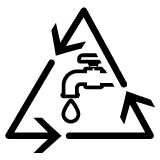Challenges
In many developing countries appropriate sanitation infrastructure is either non-existent or is failing to cope with rapid population growth. Additionally, inadequate hygiene awareness results in severe health problems and environmental hazards. Access to sanitation is a human right that safeguards health and human dignity. Every person deserves to be protected from problems caused by poor disposal of excreta. Unless immediate action is taken, the number of people without adequate sanitation will rise to more than 4.5 billion in just 20 years. Hardest hit will be the poor living in densely populated urban areas.
GFA approach and services
 © ©mrks_v | stock.adobe.com
GFA’s approach to sanitation is holistic and characterized by adherence to sustainability aspects, paying attention to users’ preferences and the services they want and for which they are willing to pay. GFA puts household at the centre and includes hygiene and sanitation promotion as well as social marketing. Sanitation systems have to be economically viable, socially acceptable and technically and institutionally appropriate to ensure that they protect both human health and the environment.
© ©mrks_v | stock.adobe.com
GFA’s approach to sanitation is holistic and characterized by adherence to sustainability aspects, paying attention to users’ preferences and the services they want and for which they are willing to pay. GFA puts household at the centre and includes hygiene and sanitation promotion as well as social marketing. Sanitation systems have to be economically viable, socially acceptable and technically and institutionally appropriate to ensure that they protect both human health and the environment.
Support to sewerage utilities
The organizational and managerial development of public sewerage utilities is necessary to foster a response to changing demand. Under this condition only, public sanitation infrastructure can be operated and maintained efficiently. GFA supports service providers in improving service provision considering functionality, asset ownership, finances and operations as well as regional clustering in order to benefit from economies of scale. Management systems that address effective operations and customer services serve as a basis of tailor-made and needs-based training and support programs.
Upscaling basic sanitation for the urban poor
Due to a lack of investment within the sector, a large and growing number of people live in urban low-income areas without access to affordable and adequate sanitation services. In addition, current policies and legal frameworks of utilities and politicians do not sufficiently focus on low-cost solutions and low-income areas. GFA supports sector stakeholders to implement a comprehensive scaling-up approach for sustainable access to sanitation services. Therefore, GFA emphasis is on strengthening the sector framework by supporting the establishment of financing mechanisms and national standards. This will improve service quality and quantity as well as transparency. In collaboration with the utilities, information systems are completed to provide a baseline for effective management decisions. The development of realistic and affordable last mile infrastructure toolkits such as decentralised wastewater treatment facilities or household and public toiletscomplement first mile infrastructure. This way, sustainable sanitation services are provided to low-income areas within a reasonable time frame and in a cost-efficient manner.
Contact
 Afrim Kalanderi
Afrim Kalanderi
Department Director Water, Sanitation and Waste Management
E-mail: afrim.kalanderi[at]gfa-group.de







